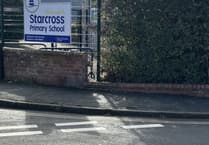EXETER’S position as a ‘city of ambition’ and one of the West Country’s economic powerhouses will be reinforced by the forthcoming local government shake-up, according to its civic leader.
City council leader Phil Bialyk (Lab, Exwick) was speaking as councillors gave a near-unanimous thumbs-up to a proposal for the city to spread its boundaries and take its place in a new nationwide structure.
Subject to a final green light from the council’s executive committee tonight (November 26), Exeter has backed having four new unitary authorities covering Devon from 2028, when the government will wipe out the current structure.
One would be an expanded Plymouth, taking in parts of the South Hams; another would be an expanded Torbay, also absorbing parts of the South Hams, and a third would be a ‘rest of Devon’ council.
Exeter – as the other council in the four-way split – would spread out into parts of Teignbridge, East Devon and Mid-Devon, absorbing communities that already look to the city for work, education, shopping and leisure.
“Exeter has the economic potential to power the region,” said Cllr Bialyk. “This isn’t just a plan for Exeter alone, it’s a plan for Devon as a whole, for cities and towns, for coastal communities and rural villages alike.
“Local challenges need local solutions, and that’s exactly what this proposal is trying to get us back to.”
Cllr Michael Mitchell (Lib Dem, Duryard and St James) said the proposals from Devon’s district councils for a ‘1-4-5’ structure which gives an independent Plymouth but rounds Exeter up in the same unitary authority as East Devon, Mid Devon, Torridge and North Devon were an ‘Ikea’ solution – ‘taking existing district councils and screwing them together’.
And, he said, the ‘9-1-1’ structure favoured by Devon County Council – with Plymouth and Torbay independent and the rest of the county all in one big authority – would mean ‘too few governing too many’.
Cllr Tammy Palmer (Lib Dem, Duryard and St James) warned of a potential power grab by central government which could weaken local control of planning issues, but Cllr Paul Knott (Lab, Exwick) said it could give the city more control over local building projects and help it stop neighbouring councils allowing developments on Exeter’s borders, taking all the benefits while Exeter provides the services.
Children with special needs are currently being failed by Devon County Council, said Cllr Mollie Miller-Boam (Lab, Pinhoe).
“The picture is bleak,” she said. “This isn’t a criticism of our hardworking staff in schools, it’s a criticism of a system that’s no longer fit for purpose.
“Reorganization gives us a chance to do things differently. We’re not just moving the deck chairs on the ship, we’re choosing the shape of the ship. Let’s build one that serves children better than the one we have now.”
Cllr James Cookson (Lab, Topsham) agreed, saying: “I’m tired of making excuses for Devon County Council’s poor services to our residents.”
Summing up, Cllr Matthew Vizard (Lab, Newton and St Leonard’s) told colleagues: “We need to be bold and innovative in every area. This is an opportunity to get things right for the future – to embrace a sustainable future and an inclusive future for all.”
Thirty five of the 36 councillors in the Guildhall voted to back the city council’s strategy. None voted against and one abstained.





Comments
This article has no comments yet. Be the first to leave a comment.